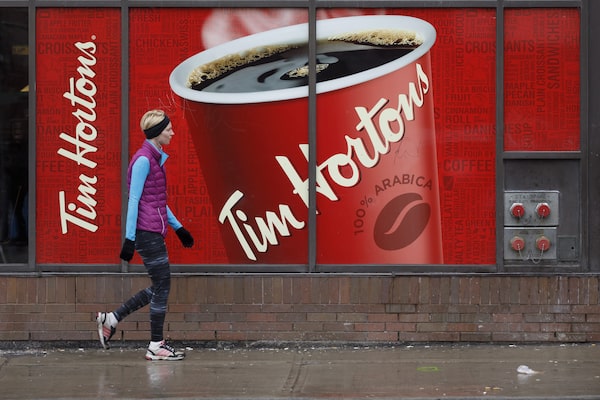
A Tim Hortons restaurant in Toronto, on March 6, 2020.Cole Burston/The Canadian Press
Bruce Philp is a branding consultant and author of Consumer Republic, a winner of the National Business Book Award.
It began for Hockey Canada with a sexual assault allegation – one of many, it would turn out, a pattern that included quietly settling these allegations with organization funds. Angry political attention was met with the hiring of spin doctors and not much contrition on the part of the organization.
Then, the weight of the betrayal finally overwhelmed Canada’s starry-eyed passion for hockey. Corporate sponsors one after another announced they wanted no more to do with Hockey Canada. The safest sponsorship bet in the land had suddenly become toxic.
My reaction to the human drama unfolding at Hockey Canada has probably been like yours: deep sympathy for the people it has hurt, for many of whom this is all still a long way from over. But when it comes to the corporate drama, a single name keeps leaping off the screen at me: Tim Hortons.
Like any corporate sponsor caught in a crisis, Canada’s beloved quick-serve restaurant has been part champion, part opportunist, part unwitting enabler and part collateral damage. Uniquely for Tims, though, owned by Restaurant Brands International Inc., this crisis has risked being a knife in the heart of what we want to believe that brand stands for, and nobody with a reputation to protect should miss the chance to learn from it.
Corporate sponsorship has always been one of marketing’s simpler bargains. At the very least, writing those cheques bought access to more-than-typically attentive audiences. And there was even more reputational value if a sponsorship had anything to do with the sponsor’s product. Either way, money could get a brand’s name in lights, glowing thanks for its “support” and maybe some playoff tickets for the sales department.
Sponsorship allowed a brand to vicariously bask in the competitive glory the audience was there to celebrate, and with a little common sense, it was hard to go wrong. The risks were obvious and containable, and the worst of them was merely that a property would somehow turn out to be a poor fit.
That’s certainly not a mistake Tim Hortons ever made. As deeply as hockey is woven into Canada’s cultural mythology, so was Tims woven into hockey’s. Decades of investment from the grassroots up made the brand inseparable from the national sport, drawing a clear, sentimental line from little kids at camp all the way to the big leagues. Wherever ice meets metal, as Tom Cochrane put it, there was Tim Hortons.
It’s been a textbook case for how to do sponsorship right: Commit, broadly and for the long haul. Do it for love. And be of service. I don’t think I’ve ever been part of a boardroom conversation about sponsorship in this country that didn’t end up with that case pinned to the wall as exemplar.
But there are no simple bargains in marketing any more. Given a more morally engaged – and savagely cynical – consumer, and the ubiquity and fast flow of information in this new age that causes relentless journalism to travel farther, PR crises have longer, more unpredictable lives.
And the internet agora enables and goads public commentary to the point where audiences now often decide how a debacle will end. Where once a corporate sponsor could exit a crisis with a phone call and a news release, now it’s like getting caught up in a celebrity divorce. Sides get taken. Dirt gets dug. And the audience looks at brands like former friends of the couple as if to say, “Well?”
This week, Tim Hortons, Bank of Nova Scotia, Telus and Canadian Tire gave us their answers. But none more starkly highlighted the perils of sponsorship in the digital age than that first one. Sponsorship’s return on investment grows the more deeply you commit, that much remains true.
But now that commitment can transform a brand from advertiser into participant – part of the action rather than adjacent to it – exposing it to judgment that’s more moral than commercial, and potentially more devastating.
As citizens, we can probably feel good about this new layer of accountability. But for marketers, it’s a cautionary story about how the fates of brands and their promotional vehicles become intertwined, and how writing that sponsorship cheque only means the game has just begun.